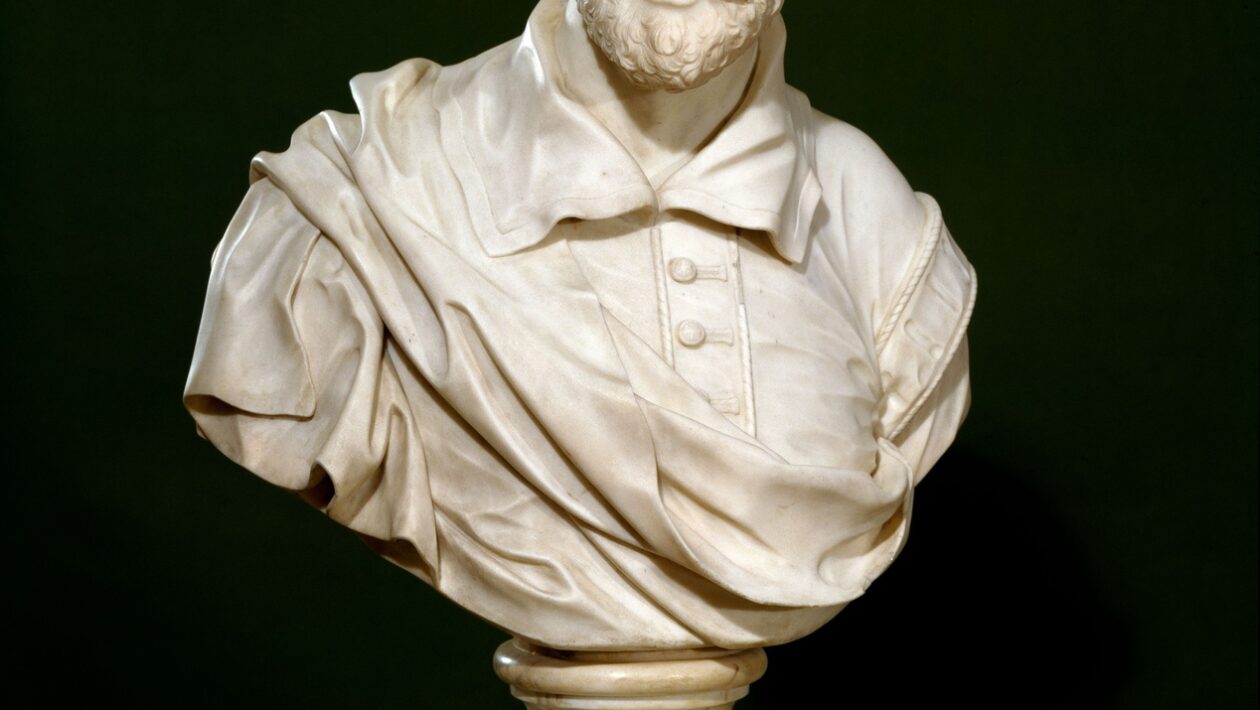The un-Shakespearean quality of the first two acts has been noted and are generally accepted as being the work of George Wilkins. Notes and Queries ccxiv (1969) 288-91 and ccxv (1970) 135-141 had suggested Wilkins as the likely author (and perhaps Heywood and Rowley as candidates for authorship, though these attributions have been questioned cf AS (1963) lvii). The general consensus now, e.g. OS (2003, ed. Rogerr Warren) is for Wilkins, although F. D. Hoeniger argued the case for attribution to John Day (AS 1963 lxii-lxiii and App. B pp. 171-180). In his commentary on the place of music in the play, (ib.lxxviii-lxxix), he notes how nowhere else did Shakespeare use music as often and as widely except in The Tempest where in both ‘when the storms subside, music takes over’. See also N&Q vii (1960) 172-4 article by J. P. Cutts ‘Pericles’ Most Heavenly Musicke’.
In this ‘miracle play’ F. W. Sternfeld notes how it ‘utilises music prominently and extensively to mark the intervention of powers greater than man.’ B284 all music soft and insidious. Opens with 3 trumpet blasts. Cf.. Hoeniger in AS (1963) lxxviii-lxxix on the place of music in the play, noting how both here and in The Tempest ‘when the storm subsides, music takes over’. He also emphasises the musical accomplishment on the part of both Pericles and Marina. Brissenden discusses the significance of the dance in the play (BR77-84), and also follows up Geoffrey Bullough’s suggestion that Pericles could play a musical instrument (BR123). Alexander Leggatt remarks how ‘the moments of greatest wonder in the play are accompanied by music’, while the character, Marina needs to be able to sing, having been ‘trained in music’s letters’ (JN542), and singing ‘like one immortal’. (Cambridge Companion to Shakespeare comedy 2002, p. 222). See also comments at 263 and 265 below.
Conversely Nosworthy maintains that ‘such music as the play contains is a separate element whose total omission would make little or no difference’! (NN66). See also articles by William A. McIntosh ‘Musical design in Pericles’ English Language Notes, ii (1973-4) 102, and by Patricia K. Meszaros ‘Shakespeare’s Divine Musical Comedy’ in C.W.Cary Shakespeare and the Arts, 1982, pp. 3-20. Lomax (p.94-5, 97) notes how the ‘transition from earthly to heavenly happiness is made particularly through the play’s use of music’ and ‘the combination of silence and music is particularly effective in reminding the audience of the dream-like world of ghosts who live only as long as the play lasts.’
[Recent editions of the play, including The Stanley Wells Shakespeare Complete works (2nd ed. OUP 2005, pp. 1063-1086) divide the play into 22 scenes — here indicted in square brackets preceding the 5 Act line numbering which had hitherto been in general use.]
| act | scene | line | Click here to find out more about suggested song | ||
| Preamble | |||||
| [1.1] | 1-5 | [To sing a song that old was sung…To glad your ear, and please your eyes. It hath been sung at festivals] OS (2003): ‘sing a song’ means ‘tell a tale’ | |||
| 13-14 | [And that to hear an old man sing May to your wishes pleasure bring,…] | ||||
| [1:42] | I | i | 0 | {Sennet} | |
| [1:48] | 11{-24} | Music sounds (LF begins at line 5) LF37-38 COBBOLD New Fashions Leaves be green’ (Browning) voice and SATT/BB viol consort MB xxii 7; ۞R21 | (154d) 253 | ||
| [1:124-8] | 81-5 | [You’re a fair *viol, and your sense the strings Who, fingered to make man his lawful music, Would draw heav’n down and all the gods to hearken; But, being played upon before your time, Hell only danceth at so harsh a chime]. | |||
| [1:163] | 120 | {Flourish} | |||
| [5:16; 40] | Dumb show; {Thunder and lightening} | ||||
| [5:61-63] | II | i | 20-23 | [Alas poor souls it grieved my heart to hear what pitiful cries they made to us… when well-a-day, we could scarce help ourselves] DO429-432 ‘A new Welladay’ melody and text (18 verses); ۞DO ii 70whenas | (36) 254 |
| [6:0; 16; 22] | ii | 0 | {Sennet};{Flourish}; {Flourish} | ||
| [6:23-27] | [A prince of Macedon…the device he bears upon his shield… Piùe per dolcezza che per forza] ۞DO i 95 ‘The famous prince of Macedon’ set to AZZAIUOLO Chi passa | 255 (384) | |||
| [6:27,33,37,47] | 28, 33, 38, 43 | {Flourish}; {Flourish}; {Flourish}; {Flourish} | |||
| [6:60; 62] | 57, 59 | {Cornetts}; {Cornetts} and great shouts {within} | |||
| [7:98-102] | iii | 94-8 | [Ev’n in your armours, as you are addressed, Your limbs will well become a soldier’s dance. I will not have excuse with saying this *‘Loud music is too harsh for ladies’ heads’, Since they love men in arms as well as beds.] | ||
| [7:102] | 98 | The Knights dance. BR: a sword dance (*Mattachins) see *Buffons; cf Cutts Yearbook of English studies iv (1974) 49-51 ‘mock combat and fertility rite’ | 256 | ||
| a) LF40-1: i) 1597 HOLBORNE Pavane, see note at 151a | (34a) | ||||
| and ii) BYRD ‘Monsieur’s almaine bcM15; ۞EmR 13 (after anon lute piece (tTh311/ BO f42 170) WY 19; ۞MsE ii 15/ ۞WY 19; tune SB313); HOLBORNE ‘Monsieur’s almaine [J14] cittern HC17/ LSoc C31: 4; BACHILER DR22 (Almaine no 1); ۞BreG12; gRP4; ۞Pd4; setting to ‘O noble England’ in 15 verses DO 266-270; ۞DO ii 41/ ۞Eg4. | |||||
| b) (DLC) BYRD Ye Souldier’s dance (after popular tune ‘A soldier’s life’) | (27) | ||||
| [7:103-8] | 99-105 | [So this was well asked, ’twas so well performed. Come, here’s is a lady that wants breathing too: And I have often heard, sir, that the knights of Tyre Are excellent in making ladies trip, And that their *measures are as excellent./ In those that practise them they are, my lord.] | |||
| [7:110] | 107 | They dance. BR *pavane; LH10 an *almain. | 257 | ||
| (LF41-2): 1599 HOLBORNE H10/ H1025 galliard à 5 rSSATB Hb iii 4 DQ7 LF provides only soprano and bass lines AS64 compares with ‘Amazons’ dance’ in ToA I ii 132 | (318) | ||||
| [8a: 8; 10; 15] | Enter…with a stringed instrument; Pericles plays and sings; Exit with instrument | ||||
| [9:12] | v | 13 | [Loath to bid farewell…] DO256-7 ‘Loath to depart’ | (28) 258 | |
| [9:23-9] | 25-31 | [I am beholden to you For your sweet music this last night. My ears, I do protest, were never better fed With such delightful pleasing harmony./ It is your grace’s pleasure to commend, Not my desert./ Sir, you are music’s master./ The worst of all her scholars, my good lord.] | |||
| [10:14] III | i | 14 | *Dumb Show. B284 avers ‘certainly with music’ | (40) 259 | |
| 229 | Music of the spheres | ||||
| [12:86-9] | ii | 88-91 | [The still†and woeful music that we have, Cause it to sound, beseech you. Music The vial once more;. How thou stirr’st, thou block! The music there! I pray you, give her air] †Folio has ‘still’ in place of ‘rough’ AS (1963) 91: quarto manifestly wrong. cf JN542 on the music’s magical effect | ||
| [12:95-102] | {98-104} | {Sweet music} LF42-3: 1607 HUME Lesson for bass viol solo MB ix 123 | 260 | ||
| [15:5-11] IV | Prologue | Enter Gower. [Now to Marina bend your mind…by Cleon trained In | |||
| 5-11 | music, letters; who hath gained Of education all the grace…] | ||||
| [15:25-7] | 25-7 | [when to th’ lute She sung, and made the night-bird mute, That still records with moan] W10 talent expected of eligible young lady | |||
| [18:22] | iv | 22 | (Dumb show) B284: certainly with music | (259) 261 | |
| [18:42-4] | 49-50 | [while our scene must play His daughter’s woe and heavy *WELL-A-DAY In her unholy service.] | (36) 262 | ||
| [19:206] | vi | 191-2 | [Proclaim that I can sing, weave, sew, and dance] | ||
| [20:3-4] | V – | 3-4 | Enter Gower. [She sings like one immortal, and she dances As goddess-like to her admirèd lays]. | ||
| [21:35] | 35 | [She questionless with her sweet harmony] | |||
| [21:67] | i | 79 | The Song (no text) MH140 celestial serenity of her song: viol fancy played on recorders. Leggatt notes her singing ‘begins the cure of his mute lethargy’ | 263 | |
| a) LF43-6: 1597 HOLBORNE [J53] HC14 as ‘Amongst the harlots foule I walk: version of the Spanish pavane. OS 290 App.D gives the text of two verses | (142a) | ||||
| b) uCM200-1: 1596 ‘*Fortune my foe’ +rSATB | (182) | ||||
| c) (B284) JOHNSON ‘Care-charming sleep’ | (115c) | ||||
| [21: 68-9] | 80-81 | [Marked he your music?/ No, nor looked on us.] | |||
| [21: 209-221] | 225-33 | {Celestial music} [But hark, what music?…But what music?/ My lord, I hear none./ None? The *music of the spheres! List, my Marina.…Rar’st sounds. Do ye not hear?/ Music, my lord.] (MH140): inaudible to ordinary mortals (Warren p. 58); recorders – instruments of divinity (Dyce: heard only by Pericles); see Cutts in Notes & Queries vii (1960), 172-4 and ME209 | (172) 264 | ||
| [21: 219-221] | 234 | [I hear most heav’nly music. It raps me unto list’ning, and thick slumber Hangs upon mine eyelids. Let me rest.] | |||
| [21: 224-235] | 240 {-250} | Diana descends from the heavens {Diana appears…as in a vision}. {Grave music}. musicians hidden MH140: a voluntary on recorders. Leggatt remarks how this moment of greatest wonder is accompanied by music | |||
| LF46-7: 1570 (LO) ‘A Measure’ lute/t LSoc B3, tune and steps DF53-4; rS/A/TS DP i 5 | 265 | ||||
| 21:253] | {Diana ascends into the heavens} | ||||
| [22:6-9] | ii` | 5-9 | [What pageantry {descends from the heavens}, what feats, what shows, What minstrelsy …To greet the King |

